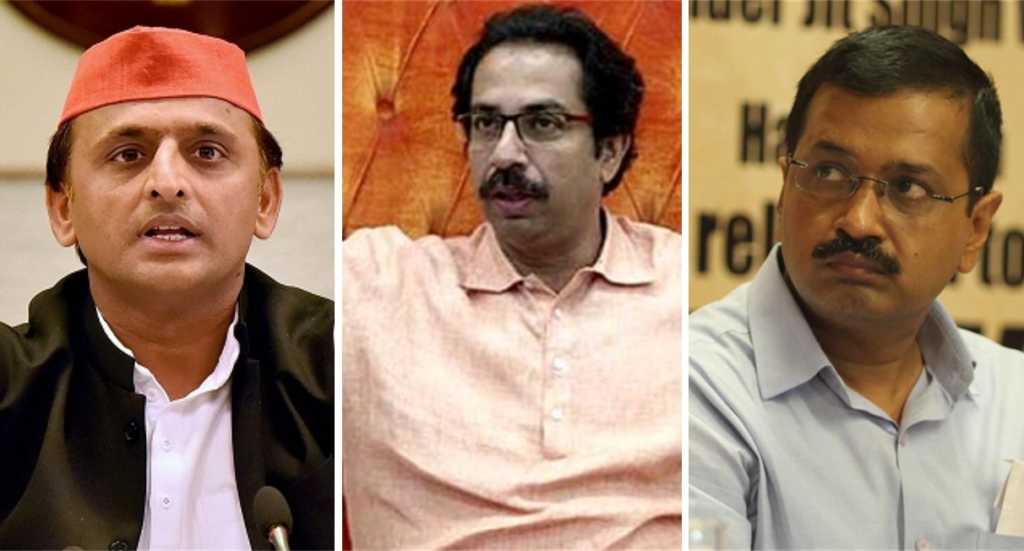Regional parties have played an important role in Indian politics since the 1990s but whenever they tried to expand their wings outside their core constituencies, they have failed miserably. In the latest Karnataka Assembly Elections, Samajwadi Party could not win a single seat out of the total 24 seats it contested in; in fact, all of its candidates lost their deposits. Candidates put up by JDU (28), Shiv Sena (37) and AAP (28) met with the same fate. Candidates lose deposit if they fail to win one-sixth of total valid votes. So Aam Aadmi Party could not make a difference outside Delhi, SP could not win a single seat outside Uattar Pradesh and Shiv Sena could not win outside Maharashtra. The Left could not make an impact in northern India; Dravidian parties are confined within Tamil Nadu, and so on and so forth. These examples point out towards the conclusion that regional parties are not being successful outside their home turf, even if they forge alliances with other regional parties from outside their own state.
Regional parties have not been able to give a tough fight to BJP even in their home turfs, which makes one wonder why they are trying hard on the national level. Since BJP President Amit Shah took over the reins of the party, he has been successively wiping out regional parties in one state after another. In Uttar Pradesh, Samajwadi Party and Bahujan Samaj Party used to be two the main players but in the Uttar Pradesh Assembly Elections 2017 they were reduced to 54 and 19 seats respectively. Since SP has won the Chief Minister’s seat in the state for four times, being reduced to 54 seats from the previous 403 is more than an embarrassment. Bahujan Samaj Party (BSP) Supremo Mayawati, who was dreaming of one day becoming Prime Minister, saw her party reduced to a mere 19 seats in a state where she has been the Chief Minister four times. The trio of PM Modi, Amit Shah, and Yogi Adityanath reduced SP and BSP to ashes in the legislative assembly.
Shiv Sena used to have the upper hand on BJP in Maharashtra since the coalition was formed in 1995. The coalition was based on the shared ideology of Hindutva, with both parties having come to the understanding that Shiv Sena would naturally get more seats for Assembly Elections since it is a regional party, while the BJP would get more seats for Lok Sabha elections since it is a national party. In 2014, when Amit Shah became the Party President, he disagreed with the BJP playing the role of the younger brother in the richest state of India, and the twenty year old alliance immediately broke apart. Fighting alone in the state, the BJP won 122 seats out of 288, reducing Shiv Sena to second place with a mere 62 seats. Although Shiv Sena joined the BJP government in a post-poll alliance it plays the role of an unofficial opposition in Maharashtra.
AAP is the most ambitious party in India, while it simultaneously has the least chances of doing well outside Delhi. It tried its hand in every major election since winning Delhi but Arvind Kejriwal has faced disaster everywhere. Every candidate of his party forfeited their deposits in the Karnataka election. In an attempt to disrupt BJP’s chances of winning in Gujarat, his party contested the Legislative Assembly Elections but almost all of their candidates lost their deposits. The only election they could make an impact was the one in Punjab, which was contested more by BJP’s ally Shiromani Akali Dal than by the BJP in itself.
The regional parties should try and protect their home turfs from the Modi-Shah juggernaut rather than trying to disrupt BJP’s chances in other states. These meek attempts point to the fact that there is a failing strategy from regional parties and opposition factions to try and keep the Modi wave at bay, keeping in mind the 2019 Lok Sabha elections. However, their consecutive failures at the State level have only gone onto strengthen the BJP’s resolve while effectively eliminating their own limited chances before the 2019 General Elections.
